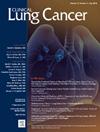CNS Outcomes of Osimertinib Plus Chemotherapy in Patients With EGFR Mutation Positive Lung Cancer Beyond Osimertinib Progression
IF 3.3
3区 医学
Q2 ONCOLOGY
引用次数: 0
Abstract
Background
Central nervous system (CNS) metastases are common among patients with epidermal growth factor receptor (EGFR) mutation positive non–small cell lung cancer (NSCLC). Osimertinib in combination with chemotherapy beyond osimertinib progression may minimize CNS progression.
Method
In this retrospective analysis, patients with advanced EGFR mutation positive NSCLC and brain metastases who received platinum-based chemotherapy (PbChT) after disease progression on osimertinib were enrolled. The primary endpoint was real-world CNS progression-free survival (rwCNS-PFS) between patients who received PbChT with and without osimertinib continuation. Secondary endpoints included competing risk analysis of CNS progression and incidence of salvage radiotherapy to brain.
Results
A total of 101 patients were analyzed, out of which, 39 (39%) continued osimertinib with chemotherapy (OSI+ cohort) and 62 (61%) received chemotherapy alone (OSI- cohort). Median rwCNS-PFS was significantly longer in the OSI+ cohort (9.0 months, 95% CI 6.6-11.4) than the OSI- cohort (5.7 months, 95% CI 4.6-6.9) (HR 0.37, 95% CI 0.18-0.76, P = .007). This remained significant after adjustment for EGFR mutation, line of osimertinib treatment, prior radiotherapy to brain, and CNS progression on osimertinib monotherapy. Estimated probability of CNS progression at 6 months was 5.6% in OSI+ cohort versus 20.9% in OSI- cohort. Incidence of salvage radiotherapy to brain was lower in the OSI+ cohort (15%) compared to OSI- cohort (24%).
Conclusion
In patients with EGFR mutation positive NSCLC and brain metastases, continuing osimertinib with chemotherapy after progression on osimertinib significantly reduced risk of CNS progression. Prospective studies are warranted to define the optimal treatment strategy for this patient population.
EGFR突变阳性肺癌患者在奥希替尼进展期后接受奥希替尼联合化疗的中枢神经系统疗效。
背景:中枢神经系统(CNS)转移在表皮生长因子受体(EGFR)突变阳性的非小细胞肺癌(NSCLC)患者中很常见。奥西替尼联合化疗可使中枢神经系统进展最小化。方法:在这项回顾性分析中,纳入了晚期EGFR突变阳性的NSCLC和脑转移患者,这些患者在疾病进展后接受奥西替尼铂基化疗(PbChT)。主要终点是接受PbChT和不接受奥西替尼延续治疗的患者之间的真实世界无进展生存期(rwCNS-PFS)。次要终点包括中枢神经系统进展的竞争风险分析和脑补救性放疗的发生率。结果:共分析101例患者,其中39例(39%)继续奥西替尼联合化疗(OSI+队列),62例(61%)单独化疗(OSI-队列)。OSI+组的中位rwCNS-PFS(9.0个月,95% CI 6.6-11.4)明显长于OSI-组(5.7个月,95% CI 4.6-6.9) (HR 0.37, 95% CI 0.18-0.76, P = 0.007)。在调整EGFR突变、奥西替尼治疗线、先前脑放疗和奥西替尼单药治疗的中枢神经系统进展后,这一结果仍然显著。6个月时,OSI+组CNS进展的估计概率为5.6%,而OSI-组为20.9%。脑补救性放疗在OSI+组中的发生率(15%)低于OSI-组(24%)。结论:在EGFR突变阳性的NSCLC和脑转移患者中,在奥西替尼进展后继续奥西替尼化疗可显著降低中枢神经系统进展的风险。有必要进行前瞻性研究,以确定该患者群体的最佳治疗策略。
本文章由计算机程序翻译,如有差异,请以英文原文为准。
求助全文
约1分钟内获得全文
求助全文
来源期刊

Clinical lung cancer
医学-肿瘤学
CiteScore
7.00
自引率
2.80%
发文量
159
审稿时长
24 days
期刊介绍:
Clinical Lung Cancer is a peer-reviewed bimonthly journal that publishes original articles describing various aspects of clinical and translational research of lung cancer. Clinical Lung Cancer is devoted to articles on detection, diagnosis, prevention, and treatment of lung cancer. The main emphasis is on recent scientific developments in all areas related to lung cancer. Specific areas of interest include clinical research and mechanistic approaches; drug sensitivity and resistance; gene and antisense therapy; pathology, markers, and prognostic indicators; chemoprevention strategies; multimodality therapy; and integration of various approaches.
 求助内容:
求助内容: 应助结果提醒方式:
应助结果提醒方式:


